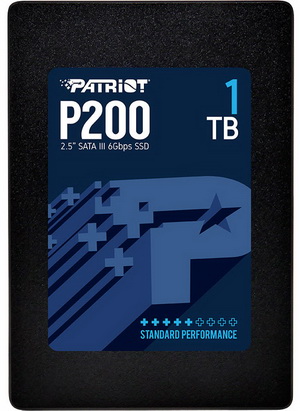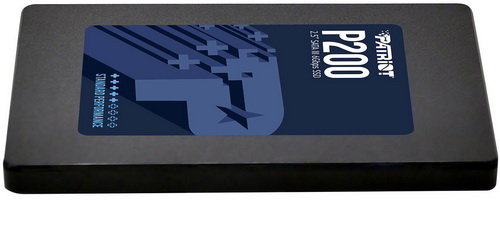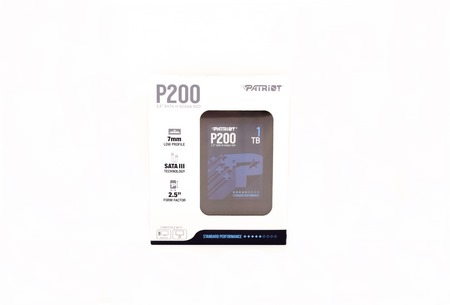INTRODUCTION

Even though M.2 NVMe (PCIe 3.0/4.0) solid state drives are currently leading the market in terms of read and write data performance they are still way behind 2.5" SATA III drives in terms of sales. This however is not just due to compatibility issues with older systems (both desktops and laptops) but also due to the fact that many system builders (including OEM ones) mostly choose 2.5" SSDs for their low/mid-level models. That being said even though they simply can't compete with M.2 NVMe SSD models in terms of performance 2.5" SSD models still do outperform regular hard disk drives (HDDs) with ease and so they truly represent great value for people who just want to upgrade their old systems without spending much in the process. Patriot recently introduced the P200 series of 2.5" SATA III SSDs and with us today we have the 1TB variant.
Patriot started in 1985 in the San Francisco Bay Area. We dedicate ourselves to being the brand of choice for the tech industry with a high commitment to quality and outstanding customer service. Patriot Memory designs, manufactures and markets high performance memory modules, flash memory, mobile accessories and gaming equipment. Here at Patriot, we pride ourselves in developing new and innovative products that offer a sleek, modern and functional design. Along with high quality and innovative designs, our products come backed with our industry leading warranty and top of the line customer support. We ensure that every product meets or exceeds our high level of standards. For memory, that process begins with using high-quality components and ends with rigorous functional testing to ensure each module is reliable and compatible. All of our tests include real world stress tests, drop tests and over charge tests as well. We do all of this so you can rest assured that you'll be receiving a high quality product.
The P200 2.5" SATA III series is currently available in 256GB/512GB/1TB/2TB capacities and much like many other mid-end 2.5" SATA III SSDs lately it's based on the DRAM-less SM2258XT quad-channel NAND flash controller by Silicon Motion (strangely enough the 2TB variant seems to be using the Maxio MAS0902A controller instead) paired with Micron's 64-layer 3D TLC NAND flash (this combination allows the 1TB variant to reach performance numbers of 530MB/s in read and 460MB/s in write). Although DRAM-less the Silicon Motion SM2258XT NAND flash controller still packs several technologies like static data refresh (ensures data integrity), error-correction, global wear-levelling, S.M.A.R.T, TRIM, NCQ, thermal-throttling, active garbage collection, DevSleep (device sleep - power saving feature) and SLC write caching (algorithms for optimal sustained performance). Finally Patriot covers the P200 series of 2.5" SATA III SSDs with a limited 3-year warranty and reports rather impressive write endurance numbers of 160TBW for the 256GB model, 320TBW for the 512GB model, 640TBW for the 1TB model and 1000TBW for the 2TB model (all models feature an MTBF of 2 million hours).
SPECIFICATIONS AND FEATURES

THE P200 1TB
As with past models Patriot ships the P200 inside a small box that has a clear plastic window at the front from where you can actually see the drive.
The features list is printed at the rear of the box in 9 languages.
Only the drive is placed inside the box and as you can see Patriot clearly states that this is a "standard" performance model on its sticker.
Several certifications along with the series name and model capacity are printed on another sticker located at the base of the aluminum housing.
At the rear of the drive we find the typical SATA data and power connectors.
Opening the enclosure requires removing two small Philips screws from the sides.



At the top of the PCB we find the SM2258XT NAND flash controller and two 512GB 64-layer 3D TLC NAND flash modules (there are two extra slots for modules which are probably used in the 2TB variant).
On the other side of the PCB we find 4 empty NAND flash module spots which may be populated with other capacity variants.
TEST BED


TESTING METHODOLOGY
After over 10 years of testing solid state drives, we’ve concluded that it's almost impossible for any single benchmark suite to accurately measure their performance and that's why in certain benchmark suites we see amazing read/write performance numbers with some drives while in others things are quite different. The reason behind this is that some benchmarking suites are configured to read and write random chunks of data while others read and write constant (sequential) ones. So that's why i always use a very wide selection of benchmarking suites including AIDA64, HD Tach RW, HD Tune Pro, Crystal Disk Mark, Sisoftware Sandra Pro, AS SSD, IOmeter and ATTO. To get the most accurate results each test gets repeated a total of 6 times with the average performance numbers recorded into our charts*. Also, as of February 25th 2015 our results will also include the Storage Networking Industry Association’s (SNIA) IOMeter tests. These tests include a 12 Hour write test used to “simulate” performance degradation over time and a mixed workload test which basically shows what you can expect when using an SSD continuously for roughly two hours. Unfortunately, due to the time required for these tests we repeat them a total of 3 times and not 6 as the above.
Many people have made inquiries about our charts in the past so once again please do keep in mind that the Charts have the average performance numbers of each drive recorded and not the peak (highest) ones. Also, although every single one of these programs can help potential buyers choose the right drive for their needs you should also remember that from any kind of benchmark up to real world usage the gap is not small (and usually most differences will go unnoticed by most people). All tests were performed in a fresh Windows 10 Pro x64 installation with every update installed up to the date of this review.
* Since November 2018 our SSD comparison charts have been divided to 2.5” and M.2 models to reduce their growing size.
TEST RESULTS - AIDA64 / ATTO


TEST RESULTS - HD TACH RW / HD TUNE PRO


TEST RESULTS - SISOFTWARE SANDRA PRO / CRYSTAL DISK MARK X64


TEST RESULTS – AS SSD / IOMETER


TEST RESULTS – IOMETER SNIA

CONCLUSION

DRAM-less models are supposed to be low-cost alternatives to people who are simply not able or not willing to spend much on a brand new SSD. Because of that their read and write performance is usually quite inferior to that of regular SSD models that also sport DRAM modules inside. Still as you can easily tell from our charts the P200 holds its own against most of the competition, DRAM-less or not (it even surpasses several “high-end” models). Unfortunately unlike their M.2 NVMe counterparts due to the fact that SATA SSD models can’t use the latest Host Memory Buffer technology (and thus have no system memory access) latency in DRAM-less models may increase under heavy workloads but at the end of the day we’re still talking about an brand new SSD model so I seriously doubt this would be of any concern, especially for people on tight budgets.
With a current price tag of USD94.99 inside the USA (Amazon.com) and 111Euros inside the EU (Amazon.co.uk) the brand new P200 1TB 2.5” SATA III SSD by Patriot is priced even better than anticipated by us. Long story short you really can’t go wrong with the P200 1TB SSD by Patriot since not only does it combine a very good price/capacity ratio but both its performance and endurance/durability numbers are higher than expected and that’s also why it gets our Golden Award.

PROS
- Very Good Performance
- Features (Global Wear Levelling / SLC Write Caching / DevSleep)
- Available In 256/512/1000/2000GB Capacities
- Endurance Numbers (2 Million Hours MTBF / 640TBW For The 1TB Capacity)
- 3 Year Limited Warranty
- Price
CONS
- Value Model (DRAM-Less Design)
- No Cloning Software In The Bundle

 O-Sense
O-Sense
















.png)

